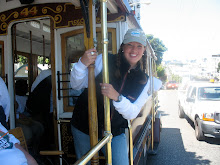
Dr. Jason Ohler, digital storytelling extraordinaire, was the Keynote speaker at the Discovery pre-conference event at the Hershey Lodge. He began by asking us what we would consider to be so outrageous right now that could be true in 10 years. Students should use their "Screasels" (screens+easels) are where students go to "paint."
Literacy: comsuming and producing media forms. Students should bea ble to write whatever they read. They should create what they want to consume/thoughtful and creative media.
Literacy is changing. Web 3.0=Read/Write/Paint/Think Rather than coding the web as a lot of text statements, the web will be tagged and a search will bring a "media report." It makes all of this information intelligable for machines.
9 Digital Literacy Action Guidelins
1. Shift from text to media
2. Value writing more than ever
3. Adopt art as 4th R---Art as a literacy
4. Follow DAOW (Digital Art Oral Written) of literacy
5. Attitude is the aptitude
6. Practice private and social literacy
7. Develop literacy about digital tools--learn how media persuades
8. Fluency, not just literacy--Understands what tools can do and can use/lead with that (doesn't have to be the best techie)
9. Harness both report and story...embrace the story! Students want a story
*Story first...Tech second*
Assessment must include the writing/research/reflection as well as the final product.
Story core includes Problem(tension), Transformation (growth), Solution (resolution)--Focus on how the character is different at the end of the story
8 Levels of growth/change
1. Physical--realizing how to do something
2. Inner strength---courage, potential
3. Emotional-maturity
4. Moral
5. Psycological
6. Social--responsibility
7. Intellectual-problem solving
8. Spiritual--awakening
Report-story=problem, visual, audio, collaborative effort, animation

 Dr. Jason Ohler, digital storytelling extraordinaire, was the Keynote speaker at the Discovery pre-conference event at the Hershey Lodge. He began by asking us what we would consider to be so outrageous right now that could be true in 10 years. Students should use their "Screasels" (screens+easels) are where students go to "paint."
Dr. Jason Ohler, digital storytelling extraordinaire, was the Keynote speaker at the Discovery pre-conference event at the Hershey Lodge. He began by asking us what we would consider to be so outrageous right now that could be true in 10 years. Students should use their "Screasels" (screens+easels) are where students go to "paint."

